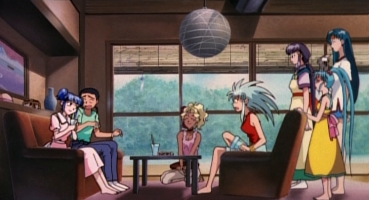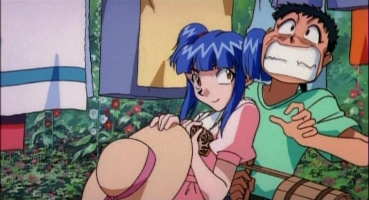|
The
Tenchi series of animé and manga has a long
and complex history, with three OVAs, three movies, two
animé TV shows, two spin-off series and a multitude
of mangas and novelisations. And to make it worse, not all
of them are in the same continuity – the same basic characters
are present in each, but their various backstories can be
radically different.
Thankfully
for viewers, movie number two – Tenchi: Daughter of Darkness [Tenchi Muyô! Manatsu no Eve] – takes
place within the first (and some might consider "main")
continuity, established by the OVAs produced under the name Tenchi Muyo!. I won't bore you with any more details
of when this movie is meant to be taking place; you can
find this information on any of the multitude of Tenchi
fan sites.

Tenchi is what's known as a "harem comedy", following in the footsteps
of Love Hina. It concerns a young man named Tenchi,
who lives at a Shinto shrine in the Japanese countryside
with his father and grandfather. One day, Tenchi accidentally
releases a space pirate named Ryoko from imprisonment at
the shrine. Her release leads the alien Princess Ayeka and
her sister Sasami to Earth in order to recapture Ryoko;
they're then joined by galactic police officers Kiyone and
Mihoshi, who seek the same goal. Travelling alchemist Washuu
then notices the commotion and decides to come and watch.
One way or another, all of these women end up living in
Tenchi's house with him. And to top it all off, Tenchi discovers
that he's actually a prince of Ayeka's royal family, and
that his grandfather was once in line to the throne of planet
Jurai.
If
this is enough to put you off, I don't blame you. It is
a lot of continuity to take in, and it's very clear that
this movie is aimed squarely at viewers who've seen the
original OVAs and have a working knowledge of the characters
and situations. The movie makes no attempt to ease new viewers
into the story, instead simply continuing with established
characterisation. I was fortunate enough to have seen two
of the TV series when they were aired on digital channel
Toonami several years ago, so I didn't exactly come into
it blind.
As
for the movie itself: shortly after Christmas (hence the
DVD's slightly belated release date of January), a strange
girl named Mayuka appears at the shrine, claiming she's
Tenchi's daughter from the future. This claim sparks a new
round of jealously between Ryoko and Ayeka – who are both
in love with Tenchi – as it's unclear who Mayuki's mother
is. In addition, Ryoko senses trouble from the amnesiac
Mayuka. She's right: Mayuka is being manipulated from behind
the scenes by the impish demon Yuzuha, who seeks revenge
on Tenchi and his grandfather.
Most
of the movie revolves around the group trying to figure
out the mystery behind Mayuka's appearance, and what should
be done with her. There are short bursts of energetic combat
throughout, as well as a protracted battle sequences towards
the end of the movie – this is typical of the Tenchi
series, which often mixes sitcom-style comedy with alien
battling, with varying levels of success. In this instance,
it doesn't work so well. The action seems forced and too
far removed from what goes on before. As for the comedy
– well, it tries hard, but never delivers a good laugh,
preferring to stick with the slapstick rivalry of Ayeka
and Ryoko, or placing Tenchi into a compromising situation
with one of the women (a hallmark of harem comedies).
The
issue of its runtime is also perplexing. Daughter of
Darkness is released as a movie, but has a running length
of barely an hour. While animé movies in general
tend to be about this length, I felt that in some places
it would've been better to extend the story into a three-episode
OVA and use the extra time to focus on more of the characters.
The only ones who get a decent amount of screentime are
Tenchi, Ryoko, Ayeka and Mayuka; Kiyone and Mihoshi might
as well be invisible. As it stands, the movie feels more
like an extended episode of Tenchi Muyo!.

On
the animation front, the artwork – character design in particular
– is good, exactly like the various TV series. Backdrops
and scenery are pleasing, with good mixtures of colour.
There is no detectable CG usage. The movie was produced
in 1997, and has aged better than most animé of that
time – there's no graininess or roughness to it, just solid
lines and colours. Muscially, it's unspectacular, with only
the ending theme remaining notable in my mind. The voice
actors are the same as from the rest of the franchise, and
while many of them don't sound suited to their roles – and
some have voices that are plainly annoying – there aren't
any technical problems and everything comes across as fine.
In
conclusion, Tenchi: Daughter of Darkness will be
of interest only to fans of the franchise, and those familiar
with the characters. Anyone else will simply be lost. While
ordinarily this would count heavily against a production,
the movie was clearly designed with hardened Tenchi
fans in mind. And to be frank, only those fans would really
appreciate this movie; it's too situational and laugh-free
for casual viewers. Even speaking as someone familiar with
the series and characters, I found this to be a little on
the dull side. Don't write off Tenchi as a whole,
though – it's still one of the most enjoyable and popular
franchises out there. It's a pity that this movie couldn't
live up to its legacy.
The picture is framed 1.85:1 and is an NTSC to PAL conversion.
Although this is standard practice for MVM animé
releases, there is no anamorphic enhancement. Colour and
detail level are quite good, but the latter is reduced noticeably
by zooming in to fit the picture to a 16:9 screen. The trouble
is, you can't do that anyway if you're watching the Japanese
soundtrack with English subtitles, as they are positioned
partly in the border area below the picture.
Japanese
and English soundtracks are offered, both as stereo 2.0
or surround 5.1. Both 5.1 tracks are well mixed, with good
frontal separation and LFE bass in places (a fireworks display,
for instance) and an effective but subtle use of the rear
speakers. Atmospheric sound is nicely handled (echoes are
well done) and there is some specific use of directional
effects. The English language mix is slightly different
to the Japanese, with some sound effects being louder in
comparison to the voices.
MVM,
usually so good with extras, have let themselves down here
– serving us only with the Japanese credits,
and trailers for the movie itself, Le Portrait
de Petit Cossette and Saiyuki Reload.
|